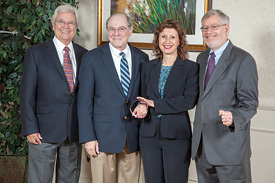U-M’s MHealthy program is one of just five in the nation to earn a C. Everett Koop National Health Award in 2012. The prestigious award recognizes programs that have rigorous evaluation studies and data to demonstrate impact on population health and cost savings.
“Every company in America should look at these examples of model programs that keep workers safe and healthy and at the same time save unnecessary health care spending for potentially preventable health conditions,” says Dr. C. Everett Koop, former Surgeon General of the United States and honorary chairperson of The Health Project.

Carson Beadle (left), chairman and co-founder of The Health Project, and Dr. Ron Goetzel (far right), president and CEO of The Health Project, congratulate Dr. Robert Winfield, chief health officer, and LaVaughn Palma-Davis, senior director of Health and Well-Being Services, on earning an honorable mention for the C. Everett Koop National Health Award for 2012. Photo courtesy the Health Project.
The award selection process is administered by The Health Project with a mission to seek out, evaluate, promote and distribute programs with demonstrated effectiveness in influencing personal health habits and the cost effective use of health care services. In 1994, the Health Project established the C. Everett Koop National Health Award, with Koop as its chairperson. Because of the rigorous standards required for documenting health improvements and cost savings, fewer than 60 organizations have been honored with this award since its inception. MHealthy earned an honorable mention this year.
MHealthy’s three-year evaluation was completed earlier this year by the Michigan Institute for Clinical & Health Research (MICHR) and the Health Management Research Center. Dr. Dee Edington, professor emeritus from the School of Kinesiology and School of Public Health, and Dr. Karen Rosentraub, research associate professor of social work and nursing, were the lead researchers on the study. Using data derived from medical and pharmacy costs from 2008-10 and health questionnaire data from 2009-11, key findings include:
• Health risk prevalence is declining: The percentage of health questionnaire participants considered to be at risk for stress, obesity, poor nutrition, mental health, back care, alcohol and smoking, showed statistically significant improvement from 2009 to 2011. Additionally, the number of individuals who are low risk overall is increasing and the number who are high risk is decreasing.
• Absenteeism is declining: Self-reported absenteeism due to illness decreased from 3.97 days per year to 3.74 days.
• Total Health Care Costs are declining: Combining medical and pharmacy costs to get “total health care costs,” non-health questionnaire participants and three-time health questionnaire participants had near equal baseline costs in 2008. By 2010, rates of increase for total health care costs were significantly greater for non-health questionnaire participants as compared to the three-time health questionnaire participants. This supports an association between participation in MHealthy and improving cost management.
The evaluation team has since carried out the cost analyses to the end of 2011, and the favorable trend continues.
Commenting on the need for effective worksite health improvement programs, Dr. Ron Goetzel, president and CEO of The Health Project said, “For the U.S. to continue to be an economic leader worldwide, supported by a healthy and productive workforce, more companies need to implement evidence-based health promotion and disease prevention programs. The good news is that when done right, these programs not only make workers healthier, they can also produce a positive return on investment.”
Learn more about MHealthy at www.mhealthy.umich.edu.

